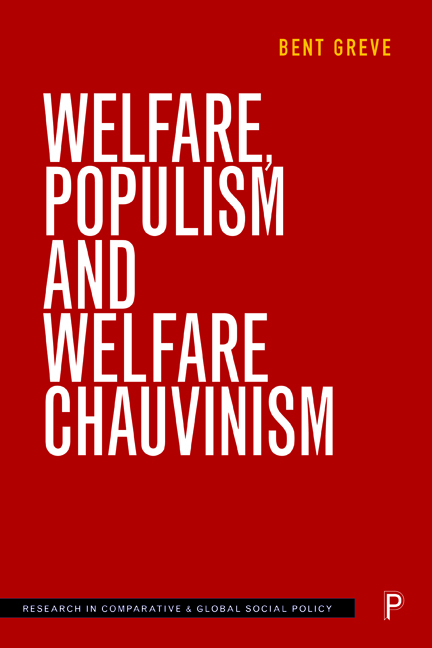Book contents
- Frontmatter
- Contents
- List of tables and figures
- Preface from the series editors
- Preface
- 1 What is it all about?
- 2 Basic concepts
- 3 Why inequality matters
- 4 Dualisation and the labour market
- 5 What form has the development in welfare spending taken?
- 6 Has social cohesion been eroded?
- 7 What do we know about citizens’ perception of the welfare state?
- 8 Populism, welfare chauvinism and hostility towards immigrants
- 9 Concluding remarks
- Index
1 - What is it all about?
Published online by Cambridge University Press: 27 April 2022
- Frontmatter
- Contents
- List of tables and figures
- Preface from the series editors
- Preface
- 1 What is it all about?
- 2 Basic concepts
- 3 Why inequality matters
- 4 Dualisation and the labour market
- 5 What form has the development in welfare spending taken?
- 6 Has social cohesion been eroded?
- 7 What do we know about citizens’ perception of the welfare state?
- 8 Populism, welfare chauvinism and hostility towards immigrants
- 9 Concluding remarks
- Index
Summary
Introduction
We have seen tendencies towards stronger support for what are labelled populist parties in many countries; support for right-wing parties often with an agenda of reducing taxes – and thus implicitly welfare state retrenchment in the years to come – but also for right-wing parties with a negative stance towards migrants and a focus on support for welfare to the deserving native population. The UK has decided to leave the European Union (EU) due to, among other things, a negative perception of the free movement of workers within the EU, but also because at least some voters perceive that decisions were taken at too far a distance from them. The blaming of the EU and a more national stance has been witnessed in several other European countries. In the US, the election of Trump as president, also with a rhetoric of them and us, can be seen in this light. He even ‘garnered votes from immigrants, Muslims and other minorities, women, and unionized workers, in spite of the fact that in previous months he had behaved or advocated policies against their interest’ (Wilkinson and Klaes, 2018: 3). There has been an argument for retrenchment in many countries in the wake of the financial crisis in order to cope with high public-sector deficits as a consequence of both supporting the financial sector and the increased pressure on societies as a consequence of the fiscal crisis. Austerity measures have been seen as important to cope with the rules within the euro area, although, as the book shows, it is not so simple to find austerity in all countries and all areas of welfare state development. These attitudes and votes go against the rational behaviour of individuals used in economic textbooks, and thus call for an analysis including an interdisciplinary approach from sociology, political science, psychology and behavioural economics.
We have witnessed stronger and more dual labour markets, and options and possibilities that societies will become even more segregated (Greve, 2017). There are varieties of gated communities that have developed not only in the US (Putnam, 2015), but also in Europe.
- Type
- Chapter
- Information
- Welfare, Populism and Welfare Chauvinism , pp. 1 - 16Publisher: Bristol University PressPrint publication year: 2019



